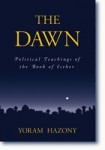The Dawn: Political Teachings of the Book of Esther (book review)
 THE DAWN: POLITICAL TEACHINGS OF THE BOOK OF ESTHER
THE DAWN: POLITICAL TEACHINGS OF THE BOOK OF ESTHER
By Yoram Hazony
The Shalem Press, revised edition, 2000
Reviewed by Rabbi Raymond Apple
If you’re put off by the title of this book or dismiss it as only fit for Biblical academics, you couldn’t be more wrong. It’s not only a beautifully written work but offers an angle on a famous story that suddenly makes something dawn in your mind, which might well explain the book title. Once you have read “The Dawn” you will never again see the Megillah as just an ancient sideshow. Instead you will have discovered what might well be the true context of the Esther story and the message of the book named after her.
Yoram Hazony’s skilful pen muses about the principles and paradigms of politics and asks whether they can be applied to the Book of Esther and indeed to other Biblical episodes, especially Joseph and Moses. Other recent writers such as Stephen Rosenberg have skilfully interpreted the Megillah as a chapter in the history of Persia; Hazony sees it as a chapter in political history in general and in particular the politics of a fragile Jewish people within a majority gentile society, with all the fragility, ambiguity and ambivalence of trying to live in two worlds.
There are two ways of presenting the philosophy of a story, suggested by the Dubner Maggid’s parable of the archer who hit the bull’s eye. You can focus on the target and reach it if you’re lucky; you can also shoot first and then draw a circle around the arrow. Likewise you can delve into a story and listen to what it tells you; or you can start with a preconceived idea and fit the facts to your theory. A good researcher does the first: he looks at his material and asks it to speak for itself. In Hazony’s case the writer wonders if the text itself suggests a political theory; he reads the material and finds that it does.
To Hazony, Esther is a story of the Jews in exile. They have no sovereign political institutions but have to try to cope within those of others. They are part of the host society, but they have Jewish priorities too. Do they compromise Jewish interests for the sake of the king’s? Do they risk their influence on the king by seeking the good of their fellow Jews? What did Joseph do, and Moses, Daniel, and Nehemiah? How do Mordechai and Esther handle the situation? What motivates the king to reject Vashti and choose Esther? Why does he abandon the counsellors who provided a semblance of democracy and give Haman autocratic power? What’s in it for the king?
Can Mordechai use the techniques of persuasion to get the public to oppose Haman? Can Esther make the king suspicious of Haman’s loyalty and save the Jews even though the Jews as such mean little to the king one way or the other? Would it help Mordechai and Esther to remain silent? What turns the king against Haman? Why does the king humiliate him? If Haman goes, who will replace him? How politically savvy are the cast of characters?
The story turns out to be an exciting political drama. If you think there is an art of politics, this is the book for you. If you think that politics is a dirty game, this book is also for you. It’s a remarkable tour de force, and you won’t be able to put it down until you get to the very last page.



